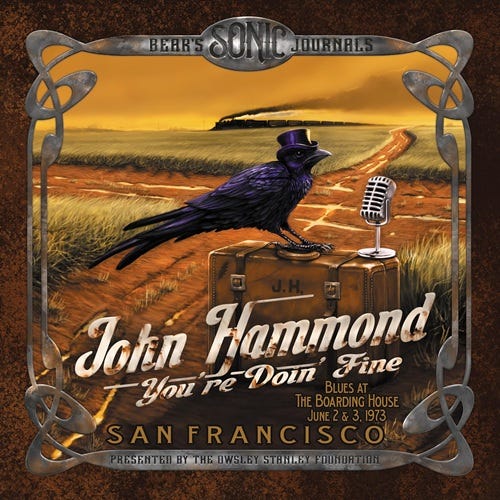John Hammond - You're Doing Fine — Blues At The Boarding House, June 2-3, 1973
(Bear's Sonic Journal, 2024)
John Paul Hammond is often better known as the son of John H. Hammond, A&R man and producer for Columbia Records, than for being a cutting edge musician and archivist during the folk and blues revival of the 1950s and ‘60s. But that he was. Hammond has recorded prolifically during his 60 year career. Most notable of his 40-some recordings are I Can Tell (Atlantic, 1967), Southern Fried (Water Music, 1969), both featuring Duane Allman, Little Big Man Soundtrack (Columbia, 1971), Wicked Grin (Pointblank, 2001) and Wicked Grin Live (Mig, 2022) featuring songs by Tom Waits, and At The Crossroads: The Blues of Robert Johnson (Vanguard, 2003).
Bear’s Sonic Journals, an element of the Owsley Stanley Foundation. Stanley is best remembered as the “Acid King” for being one of the first people to mass produce LSD that properly fueled the psychedelic era of the 1960s and ‘70s. He was also a talented recording engineer known for his particular ability to capture nuance beyond the mere sound of a performance, to include the ambiance of the venue. Stanley provided his audio services to, most notably, the Grateful Dead among many others, as evidenced by the releases on Bear’s Sonic Journals, including Doc and Merle Watson, the Allman Brothers Band, New Riders of the Purple Sage, Commander Cody and his Lost Planet Airmen, and Johnny Cash.
In 1973, Stanley set up in San Francisco’s The Boarding House to capture John Hammond over the nights of June 2nd and 3rd. The result is a 3-CD set of 45 songs that covers all subgenres of the blues: Mississippi Delta, Chicago, Texas, and Piedmont varieties. Hammond performed using an acoustic guitar and vintage National Reso-Phonic Guitars, and harmonica, all plentifully employed on these recordings.
Hammond’s organic and immediate style stemmed from 10 years of touring and recording. His songbook is large, and he shows his mastery of Chicago blues (Howlin’ Wolf’s “Wang Dang Doodle” and Little Walter Jacobs’ “Your So Fine”), Delta blues (Robert Johnson’s “Travelin’ Riverside Blues” and “Malted Milk”), North Mississippi Hills blues (John Lee Hooker’s “Boogie Chillin’” and R.L. Burnsides’ “Death Bells”), Piedmont blues (Blind Boy Fuller’s “Truckin’ Little Baby” and “Rag Mama”), and Texas blues (Freddie King’s “It’s too Late, She’s Gone”). Hell, let’s throw in some of that Excello swamp blues with Slim Harpo’s “King Bee.” Hammond used standard, open D and open G tunings, playing with finesse when necessary and manic momentum when driven.
Hammond is one of those musical eidetic repositories of blues and Americana music. His command and dedication makes worthy of continuing attention and admiration.


